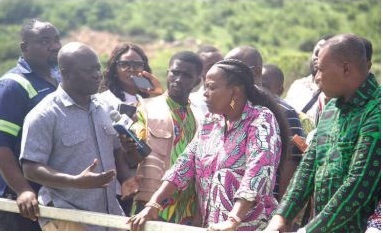
Water Resources Minister inspects Kpong, Weija treatment plants
THE Minister of Sanitation and Water Resources, Lydia Seyram Alhassan has stated that the government will put in place measures to ensure that the Kpong and Weija water treatment plants would be expanded and protected to meet the ever increasing demands of consumers.
She emphasised that in order to better serve the public, her outfit would solicit the needed funds and resources to boost the existing delivery capacity of the facilities and also enhance security measures.
“That is the purpose for which we are all here; to assess what the challenges are and to find lasting solutions to them. To go back and ensure necessary funds that are needed to protect and enhance operations are put in place,” she said.
The minister also proposed the erection of walls to protect the lands and property of the plants from intruders.
Ms Alhassan said this last Tuesday, after she paid a working visit to the two facilities to familiarise herself with their operations.
Accompanied by some senior officials from the ministry, management of both treatment plants briefed the minister about the various stages involved in supplying water to consumers.
Kpong
The Station Manager of the Kpong Treatment Plant, Yaw Agyei, explained that the plant which drew its source water from the Volta Lake and downstream of the Akosombo Dam did not require much chemicals for treatment because the water was already of good raw quality.
He also said the facility was currently producing about 40 million gallons of water per day to Accra and its environs adding that there was an existing second phase of an expansion project on the drawing board which would double the amount of water supplied.
Mr Agyei, however, lamented that they were facing electricity challenges that if not handled immediately could affect the smooth operation of the treatment plant.
He also disclosed that management was liaising with National Security to address some encroachment issues that had been developing for sometime following the construction of a railway line that had attracted settlements on the plant’s lands.
Regional Production Manager of the Weija Treatment Plant, Dr Hadisu Alhassan, said the dam on which the treatment plant was situated was constructed for agricultural purposes and water treatment but had become primarily used for water treatment over the years.
He lamented that they had experienced a high level of encroachment and constant worry of how people had settled dangerously close to the water putting their own lives at risk.
Sandwinning
Dr Alhassan stressed that the activities of such people coupled with illegal sandwinning and stone quarries had loosened the
topsoils uphill of the water and had contributed to the increased silting of the water.
He also disclosed that management was battling with invasive aquatic weeds which had the potential to greatly interrupt the smooth operation of the treatment plant.
As a result, Dr Alhassan said the entity was faced with deterioration and inconsistent raw water quality, high cost of treatment and overburdened equipment among others.
